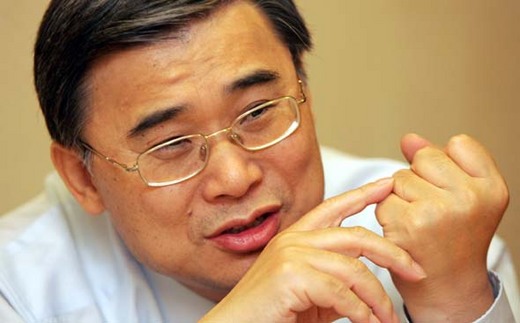 |
|
Unification Minister Lee Jong-seok' By Kim Jinsoo
|
Unification Minister Lee Jong-seok's exclusive interview with the Hankyoreh
By Jang Jungsoo and Jason Zahorchak
The recent U.S. highlighting of the North Korean human rights issue is not intended to push for regime change in Pyongyang, Unification Minister Lee Jong-seok said Sunday. In an exclusive Hankyoreh interview on May 15 marking the 18th anniversary of the Hankyoreh, Minister Lee said that there are currently dissenting voices in the Bush administration regarding just how North Korea should be handled, but that his office is "waiting for those differences in Washington to settle down."
While the United States has recently put more focus on the North Korea's human rights, the South Korean government is working to improve the North Korean human rights situation firstly by providing humanitarian aid involving food and fertilizer, and admitting refugees into the South. However, he hoped the public would understand that, due to Seoul's delicate position to transform confrontational inter-Korean relations into reconciliatory and cooperative ones, the time to freely talk about the issue has not yet arrived. "I cannot predict the future, and perhaps the day will come when we can talk about this publicly, but I believe that day has yet to come," he said.
Minister Lee says he is firm with his counterparts in Pyongyang on the issue, as well. "I tell the North Koreans that if they think some of the perspectives regarding their human rights issues are distorted, they should bring those critics to North Korea to show them the reality," he said. However, Minister Lee maintained that human rights issues must be awakened within a country following economic development. "As quality of life increases," he said, nations are able to "open their eyes to their new spot in the world. As history has proven, human rights are not something that can be solved through mere extrapolation."
Regarding another contentious Kaesong Industrial Complex in North Korea, Minister Lee emphasized, "I will throw every muscle into keeping Kaesong running." The minister also stressed the importance of working quickly to set up the Kaesong factories still in development stages, in order to ensure their survival amid an uncertain period in diplomacy. "It would be impossible for North Korea to stop factories already in operation, apart from those in the developmental stage," the minister said.
He said he was making efforts to arrange more visits by prominent Washington figures to the Kaesong Complex. He added, whenever any U.S. officials or businessmen drop by his office, "I give them a watch, branded the "Unification Watch," made by Romanson, a South Korean watchmaker operating in Kaesong."
The R.O.K.-U.S. alliance has also come under the lens in recent months. In light of the fact that Seoul agrees with Washington's view on a number of issues, the minister said, "On matters related to the Korean Peninsula, I believe the U.S. should also be able to go with Seoul's view. I think this is what the "alliance" is all about," he said.
Continuing in a discussion of U.S. policy, he said that some in Washington might be pinning a lot of hope on the planned June visit by former President Kim Dae-jung to the North, especially in regards to the restarting of the six-party talks to resolve the North Korean nuclear issue. The minister remains guarded about expectations surrounding Mr. Kim's visit. "Even if just considering the very difficult issues of the six-party talks, I think that we must not put too much weight on former President Kim's shoulders," Minister Lee said. "There is also the possibility that not a single agreement will be reached."
Minister Lee, completing his third month in his position, said that while he thinks some hierarchy is necessary in running an efficient office, he has sought to make the work environment as equalized as possible, a "communal family," in his words. "I thought that...if horizontal and vertical relations were woven together well, then organizational harmony would emerge."






